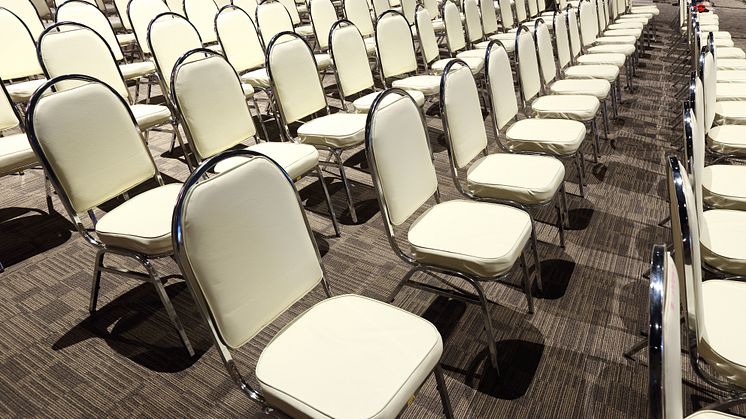
Blog post -
Eleven ways to ensure delegates don't leave your event early
So, your event is underway, but with each passing hour your audience shrinks. Some delegates leave during the coffee or lunch breaks, others walk out during the plenary sessions or breakouts.
Following my first of three columns on avoiding no-shows, this column aims to gather the best ideas to reduce the attrition during your event.
Let's consider again why people leave early:
- The content didn't meet their expectations
- They never intended to stay the full duration to begin with, or
- Something has genuinely, urgently come up.
We can't do much about the last point, so let's focus on the first two:
Your content obviously has to be top notch and the structure must avoid low-energy points. It all starts with how you start:
- Start on time – Event managers have a habit of waiting five or 10 minutes until more delegates arrive. This punishes those who arrived on time and perpetuates ill-discipline among those who didn't. Start on time. Delegates who arrive late will know better next time.
- Put on a good show – To paraphrase Thomas Edison, events are 1 per cent content and 99 per cent entertainment. That might sound a bit steep, but delegates are not engaged if the presentations are too information-heavy and devoid of fun.
- The event is for the audience, not the speakers – Too often I see events with little interaction or empathy with the audience. Sometimes, the moderator disallows delegates' questions to "protect" his panellists, or wants to "set the scene" by rambling on for 10 minutes with his/her own views on the subject. Let's remind ourselves who we are doing events for: the audience. So, moderators have to get the hell out of the way and allow delegates to get value. It should be obvious that that's a critical component of retaining your audience. But don't stop there.
- Make everyone a panellist – Panel discussions are the tried and tested way to impart information to an audience. But I am seeing a shift away from one-way presentations and panel discussions. Increasingly, events are morphing into large all-in conversations. It's much better for your audience to be involved, which is another way to engage delegates and ensure they don't leave early.
- Answer questions from the floor – Often I see presenters invited back on stage to field questions during a panel discussion. Instead, seat them around the edges of your ballroom and invite them to answer questions from there. I've tried this numerous times and it works very well because the panellists sit among the delegates, which makes it harder for them to tune out and look at their phones, and/or leave early.
- Allow thinking time – I've seen this done very well, where members of the audience were given 5-10 minutes after each presentation or panel to take notes on how they could apply the content to their own circumstances. You would think that this risks people taking the chance to leave early, but it didn't happen. It fostered engagement, and delegates were thankful for the opportunity to consider what they had just heard.
But let's assume you have done your best to ensure the content, structure and presenters are all top notch …and delegates still leave early. Here are some thoughts for how to avoid delegates planning to leave early before they even arrive.
- Send a calendar invite – I mentioned in my previous column that I seldom see calendar entries sent to block time in delegates' calendars. Eventbrite and Peatix already offer calendar entries when delegates sign up, so why shouldn't you send them, too? By holding the time in their calendars – from the start of your event to the very end – there is a reduced likelihood they will make other plans for which they will have to leave early. Be sure the calendar entry reflects the correct address details, and specifies details for what to expect at the event.
- Ask your delegates to give you advance notice – Once delegates have confirmed their attendance, don't leave it at that. You have multiple opportunities to confirm that they will stay for the entire event: Ask them in the confirmation email; ask them when you ask them to state any dietary restrictions (if you are serving a meal during your event); ask them again when they sign in at the registration counter.
- Ask your delegates from the stage – On occasion I have asked in my welcome remarks for a show of hands of who was having to leave early. It gave me an opportunity to acknowledge those who did, while cementing the commitment from the remainder of the delegates to stay for the full duration.
- Point out delegates who are departing early – Delegates who leave early usually want to do so anonymously. On occasion, I have pointed them out from the stage as they were leaving (in the nicest possible way). This discourages others from also getting up. Remarkably effective.
- De-register delegates – Your registration counter should also be your de-registration counter. Ask delegates to return their badges, collect parking vouchers or other materials only as they leave. This is your opportunity to get their feedback for why they are leaving early. Don't miss it! By understanding the real reason – such as that the event was too long, the content too dry, and so on – you can improve your next event.
Ideally this information would be captured in a feedback form, but these are often not completed either – and that will be the subject of my third and final column in this series.
Now – what are your ideas for retaining delegates and dissuading them from leaving events early?

